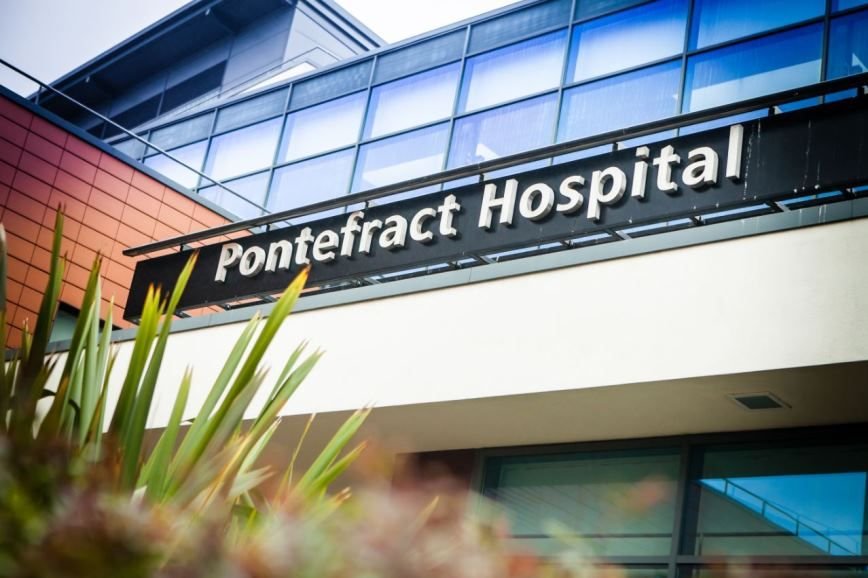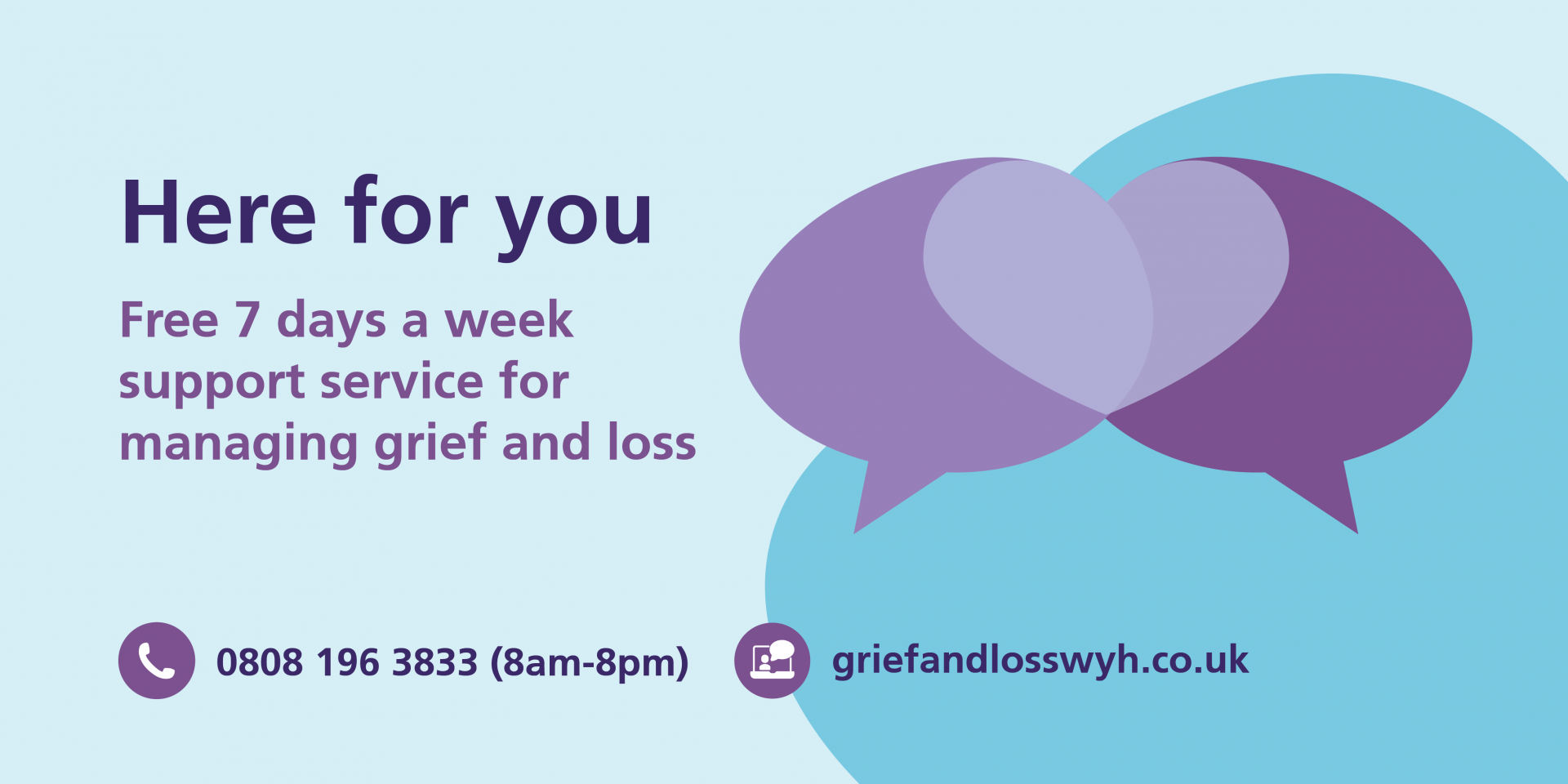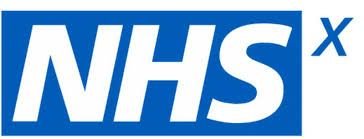Posted on: 25 September 2020
Cancer services are still here to help – a message worth repeating
Even stronger collaboration, new ways of delivering services and progress on innovation during the initial stages of the COVID outbreak mean a West Yorkshire and Harrogate system even better prepared to keep cancer and other routine services ‘open for business’ during a potential second surge. But it’s vital we convey the message to our patients that we’re still here to help.
It is very sobering to reflect on the past six months and the impact that the COVID pandemic has had on cancer services and for patients with worrying symptoms. When lockdown started on the 23rd March there was an immediate impact: across the country all care was prioritised to reduce the potential harm to patients, the public responded by self-isolating and social distancing, the health system had to make difficult decisions with patients about treatments.
What did this mean for West Yorkshire and Harrogate cancer care?
We saw a dramatic and immediate reduction in patients coming forward and being referred for investigation. This was manifest in a 70% reduction in urgent Two Week Wait referrals. Surgical treatments had to be prioritised to comply with safety requirements and to release facilities and staff to provide the necessary ventilatory capacity to support COVID patients. Our surgical and managerial teams were, however, able to maintain operating at 60% of historic rates, in contrast to areas like London where surgery rates dipped to 30%. Other forms of treatment like chemotherapy were adjusted to reduce potential harm and had a temporary dip over a very brief period. Radiotherapy treatments were again adjusted for safety reasons, but overall volumes of treatment were maintained.
 Once the peak of the pandemic receded at Easter our Alliance responded very quickly to regain the lost ground and to deal with the backlog of people waiting for diagnosis and any requiring prioritised treatment. Our analytics team had modelled that there were two big issues to deal with - the reduction in people coming forward with symptoms (of which at least 10% of whom will have cancer as a diagnosis) and the backlog of patients awaiting diagnostic tests or treatments. The system responded to this message and our providers built up COVID free facilities. These zones or hubs were created in order to ensure that cancer care in particular remained a priority. This enabled us to fulfil the challenge set by the Alliance and the Health and Care partnership of maximising our ability to diagnose cancer at a curable stage of the disease. In addition, the use of the negotiated independent sector capacity has helped enormously. In some areas it lends itself to undertaking some cancer related diagnosis and treatment, in others it is providing extended capacity for non-cancer work, freeing up NHS estate to be used for additional cancer work. Our data indicates that the reduction in backlog of patients has been tackled effectively and consistently. It has meant the number of people waiting beyond 62 days for diagnosis or treatment following urgent referral has been reducing steadily since July.
Once the peak of the pandemic receded at Easter our Alliance responded very quickly to regain the lost ground and to deal with the backlog of people waiting for diagnosis and any requiring prioritised treatment. Our analytics team had modelled that there were two big issues to deal with - the reduction in people coming forward with symptoms (of which at least 10% of whom will have cancer as a diagnosis) and the backlog of patients awaiting diagnostic tests or treatments. The system responded to this message and our providers built up COVID free facilities. These zones or hubs were created in order to ensure that cancer care in particular remained a priority. This enabled us to fulfil the challenge set by the Alliance and the Health and Care partnership of maximising our ability to diagnose cancer at a curable stage of the disease. In addition, the use of the negotiated independent sector capacity has helped enormously. In some areas it lends itself to undertaking some cancer related diagnosis and treatment, in others it is providing extended capacity for non-cancer work, freeing up NHS estate to be used for additional cancer work. Our data indicates that the reduction in backlog of patients has been tackled effectively and consistently. It has meant the number of people waiting beyond 62 days for diagnosis or treatment following urgent referral has been reducing steadily since July.
Since the dramatic dip in referrals at the start of the pandemic, our Two Week Wait referrals have now come back to normal rates (in contrast to the rest of England where the rate remains at a stubborn 80% of normal). A number of national and regional information and publicity campaigns with messaging #HelpUsHelpYou and #StillHereToHelp have contributed to this, but we know there’s more to do. We have repeated feedback from provider colleagues that people offered diagnostic test appointments are concerned about engagement with services, preferring to “wait until it is over”.
Our patients’ voice and how they have helped us
As an Alliance, our patient engagement has continued throughout the pandemic, and we are grateful in particular for the ongoing commitment and enthusiasm of our community/patient panel members and the charity Yorkshire Cancer Community for continuing to share their experiences and their expertise in support of service delivery, transformation and innovation in the context of COVID-19.
This included feedback that, for the most part our patients would prefer to continue to receive care as locally as possible and that any variation from established pathways should be the exception and only when required to expedite time critical investigation or treatment.
Patients have reported positive experiences when they do engage with services. They have helped us to define what patients want to see in order to feel reassured and confident, and we have shared this with local services to inform their restoration.
Looking to the next six months, what do we anticipate for cancer care in our Alliance?
Over the next six months we plan to restore as much activity as we can within those COVID constraints. As a Cancer Alliance, our overall aims of the next phase of recovery are concentrated in two areas:
- Minimising delays to diagnosis and treatment of people who are on our cancer pathways, focusing on those pathways and procedures most impacted by the pandemic.
- Mitigating the risk of deterioration in outcomes for tumour groups and/or populations who may have been disproportionately impacted by COVID and where a proactive approach is needed to encourage them to come forward and present with their worrying symptoms.
At its September meeting, the Alliance Board agreed to three key system-wide objectives, building on national priorities, for all statutory partner organisations to adopt to align our recovery efforts for the next six months; to support the reset, and to reduce the risk of the poorer clinical outcomes for patients to which COVID has exposed us. Read more in this letter detailing the cancer programme objectives.
 We believe the objectives are ambitious but grounded in reality. Our expectation is that they will be included in local plans, and the Cancer Alliance Board will provide the assurance around their collective delivery, on behalf of the Health and Care Partnership.
We believe the objectives are ambitious but grounded in reality. Our expectation is that they will be included in local plans, and the Cancer Alliance Board will provide the assurance around their collective delivery, on behalf of the Health and Care Partnership.
In brief, they focus on managing the immediate growth in the numbers of people requiring cancer diagnosis and/or treatment by maximising capacity for diagnostics, surgery and other treatment modalities in COVID-free settings; implementing a programme of innovative practice to support clinical assessment and triage; establishing Rapid Diagnostic Centre Services in all our local places; supporting the restart of all cancer screening programmes, including targeted lung health checks, and accelerating work on personalised support.
Also, we will continue to minimise the length of time patients are waiting for diagnosis or treatment on both urgent and treatment pathways, with immediate priority given to those who have been waiting the longest.
The final overarching objective is to reduce unmet need and tackle health inequalities. We’ll do this by analysing and sharing cancer diagnosis pre and post COVID, and use this data to determine where we need to focus our efforts to encourage people to come forward with concerns that may be cancer, so they can be referred appropriately. Lung cancer, for example, is one area where referrals have dropped significantly and are recovering more slowly.
As we heard this week COVID and the impact on our population is here to stay. We are already seeing the pressure on individual parts of our system in Bradford, Kirklees and Calderdale, this makes all the more important for us to be working collaboratively to help each other.
We need to continue to relay the message that the healthcare system is willing and able to safely take care of patients with a suspected or established cancer diagnosis. The public are still wary about coming forward as we have seen that even when offered appointments there is the public concern about taking the offer up. Just how much the recent increase in infection rates and hospital admissions will translate into a reluctance to seek advice and help will be played out over the coming months but we remain prepared to meet these challenges. We know so much more now than we did in six months ago, we are more resilient now in terms of being able to deal both with the COVID pandemic but also the care of patients with cancer.
We are prepared.
New NHS COVID-19 Test and Trace App launched
The new COVID-19 test and trace app was launched on 24 September in England and
Wales, allowing individuals to see if they're at risk from coronavirus. It can be downloaded
for Apple and Android devices.
More information about the app is available at https://covid19.nhs.uk
What else has been happening this week?
Black Lives Matter Training
We held our first West Yorkshire and Harrogate Health and Care Partnership Black Lives Matter Workshop on Thursday for Programme and Place Leads, organised by the System Leadership and Development Programme and colleagues from the West Yorkshire and Harrogate BAME Network, with special guests Dionne Edwards and Leonora Stapleton.
Mental Health Learning Disability and Autism Programme
The Mental Health Learning Disability and Autism Programme Board met on Friday 18 September with a full agenda.
Dr Sara Munro, Chair and CEO Lead for the Mental Health, Learning Disabilities and Autism Programme updated the meeting, saying that as part of our developing partnership arrangements and in the context of mutual aid arrangements and learning during the pandemic, we have been reviewing the role of the Committees in Common (CinC) of the MHLDA provider collaborative, the future of commissioning across WY&H, and the delivery of existing transformation programmes. All partners continue to support CinC arrangements, welcome the support provided and recognise the need to maintain the ability of the committee to take delegated decisions. We will continue to evolve these arrangements over the next twelve months.
Psychology workforce
We recognise that now more than ever there is a need to increase our focus on the future of psychology within our workforce models, particularly given the likely impact of the pandemic. In response, we are setting up a new psychology workforce steering group across our programme and WYAAT that considers future requirements for staff support, community mental health and other areas.
Psychological support for staff and volunteers
We’re looking to see how the system can enhance psychological support for staff and volunteers and are bidding for funding for a West Yorkshire & Harrogate –wide service. We have undertaken a survey of what partners are currently doing and will use the information coming out of the survey to inform the development of the service.

Grief and Loss
The West Yorkshire and Harrogate Grief and Loss service continues to offer support to people from all communities and is able to access translation services for many community languages, recent examples including Mandarin. We will continue to promote the service to raise awareness among our populations that the service free and available to everyone, no matter what the nature of their loss is or how recent the incident or circumstance that has led to their difficult feelings.
Suicide Prevention work with men
Our exciting Great Minds project, in association with State of Mind Sport, launched with events in Wakefield and Harrogate this week. The project is attracting attention on mainstream and social media, with our project lead interviewed on BBC Radio Leeds and Leeds Local TV.
Autism
We have now closed our survey of autistic people's experiences of barriers to urgent, crisis and emergency care and are analysing the results. With this information and feedback from our Keeping People Connected project we know that the pandemic has had a particularly tough impact on people with Autistic Spectrum Disorders from the surveys and will be exploring how the system can add value in providing support over the longer term.
CAHMS unit update
Work continues on the new CAHMS unit in Armley, Leeds.
- The metal decking is now complete for the roof and first floor.
- The concrete for the first floor slab has been poured and will create the surface for the final floor finish.
- The new brickwork and roofing works are underway and work will shortly begin on the internal partitions.
Watch the latest drone footage – the latest footage was taken on 15 September and shows how the structure is now taking shape. Look out for an announcement of the name for the unit and the launch of a new website that will share all the news, photos and videos from the site as work progresses.
New research to help mums’ mental health announced
Improving perinatal mental health services is a key priority for the West Yorkshire and Harrogate Health and Care Partnership, as set out in both Better Births – the national maternity review 2016 and the Long term Plan for the NHS 2019. In line with this, the Partnership has announced that it is funding research into the reasons behind inequalities in treatment of people who experience mental ill health during pregnancy and the first year after the birth of a child – the perinatal period. You can read more about this work on our website.
Digital programme update
Leeds Digital Festival
 The Leeds Digital Festival kicked off on Monday with an event on Inclusive Digital Transformation. Inclusive digital transformation means building a digitally enabled health and care system that works for everyone within it.
The Leeds Digital Festival kicked off on Monday with an event on Inclusive Digital Transformation. Inclusive digital transformation means building a digitally enabled health and care system that works for everyone within it.
Roz Davies from mHabitat lead the session with an expert panel - giving a National view was Paul Rice (Director of Digital Transformation across NEY region for NHS England/Improvement), providing a regional view was Dawn Greaves (Digital Programme Manager across the Partnership) and providing a local view was Justin Tutin (100% Digital Leads for the Leeds City).
The panel discussed how Covid has accelerated the digital transformation of health and care at pace. They covered topics on what digital exclusion means and why it’s so important that we tackle this head on, especially in the current climate. They also talked about ways to ensure inclusive digital transformation becomes “the way we do things around here”.
Dawn, in collaboration with mHabitat is leading a local piece of work around digital inclusion. The first workshop is scheduled for 28 September. If you are interested in finding out more about this work, please contact Dawn directly.
The North East and Yorkshire region has secured £1.5 million from NHSX to deliver a Joined-Up Care programme
 This funding will support transformation effort to scale up and adapt innovations across the NEY region. For West Yorkshire and Harrogate this includes:
This funding will support transformation effort to scale up and adapt innovations across the NEY region. For West Yorkshire and Harrogate this includes:
- Digital Care Homes: North East and North Cumbria (NENC) (Health Call) build on the delivery of the Health Call care home app across three out of the remaining four CCGs reaching 224 care homes. As a fast follower, across Yorkshire and Humber (YH) (product to be confirmed) to reach 20 early adopter care homes in each of the 3 ICSs caring for estimated total of 1,925 residents by March 2021. From April 21 an accelerated roll-out to scale across the ICSs in YH.
- Cardiology Virtual Ward (Health Call and other products): initial focus in NENC; the algorithms will be developed to support patients in mental health trusts that need to have ECG monitoring because of the anti-psychotic medication (this will be used first in Tees Esk Wear Valley Mental Health Foundation Trust). The algorithms will support primary care utilisation of BP monitoring as part of their long-term condition management and shared care requirements (this will be initially developed in Newcastle Gateshead CCG, and then will spread to the other CCGs in the NENC). Beyond March 2021, the expectation is that the enhancements will continue and be adapted and scaled to YH ICSs.
- Paediatrics Virtual Ward (TytoCare – handheld examination device): initial focus to scale from Bradford Teaching Hospitals NHS Trust to up to 6 additional provider trusts within the YH region, across each of the ICSs, supporting the care of up to 1000 paediatric patients with respiratory and other acute and chronic conditions. In addition, to work collaboratively across the region to identify and test additional use cases in other patient cohorts and settings (these could include PCNs, care homes and other hospitals).
- Complex Needs Virtual Ward (Health Navigator - AI guided case finding and clinical coaching): initial focus in YH to scale Health Navigator from Vale of York CCG (1600 patients) to an additional 2 CCGs to support the care of up to 4000 additional patients with complex multi morbidities. Beyond March 2021 our ambition is to further develop and expand Health Navigator across each ICS in the region on a CCG by CCG basis.
- There will be an inclusive digital transformation workstream across the programme run by mHabitat – this is a strong differentiator of our work from other regions.
The funding is split roughly 50% for care homes and 50% for virtual wards. It covers transformation support delivered by AHSNs, local delivery teams and some pan regional activity.
NHSX has also confirmed funding of £1.34 million for the cost of licences and clinical devices to support the project.
When?
The programme is kicking off now and will run to 31st March 2021. The region and partners are committed to helping sustain and develop the work beyond this.
Who?
The regional director of digital transformation Paul Rice is the SRO. A regional Steering Group (including each ICS) will provide programme governance and support learning across the projects and identify opportunities to develop the work e.g. pivot innovations into new areas. The project approvals will be via ICS governance and (for cardiology virtual ward) NENC CVD Network Board. The programme will be managed through a collaboration of NHS England and Improvement, Yorkshire and Humber AHSN, NENC AHSN and mHabitat in partnership with the ICSs.
How does it align with other work?
- The Care Homes Oversight Group will be used to align work around care homes i.e. NHSmail, broadband, capacity tracker, hardware, pharmacy, video consultations and education and training.
- The bids for digital first primary care might include remote monitoring proposals.
- The Cardiology Virtual Ward (Let's Talk Cardiology) is a significant programme of work and in its design also incorporates Clinical Communication Tool and Remote Monitoring fund.
Next steps
- In the coming weeks we will further engage ICSs Cardiology Networks, CCGS and other delivery partners to agree the way forward. The AHSNs will share plans and gather views.
- In early October, we expect to start the delivery phase.
Who to contact if you have any questions or to share initial views:
- Dave Belshaw, NENC AHSN: Digital Care Homes and Cardiology Virtual Ward
- Kate Lodge, YH AHSN: Paediatrics Virtual Ward and Complex Care Virtual Ward
- Roz Davies, mHabitat: Inclusive digital transformation
- Dawn Greaves, Digital Programme Manager for West Yorkshire and Harrogate ICS
Additional Remote Monitoring Opportunities
In addition, NHSX has identified further funding and is now giving us the opportunity to request more funding for licences and care homes clinical equipment. For more information about the remote monitoring opportunities see:
https://
For practical guidance on the Spark Framework please see: https://
In the first instance, please submit a simple expression of interest email titled ‘Remote Monitoring Opportunities’ to ENGLAND.

